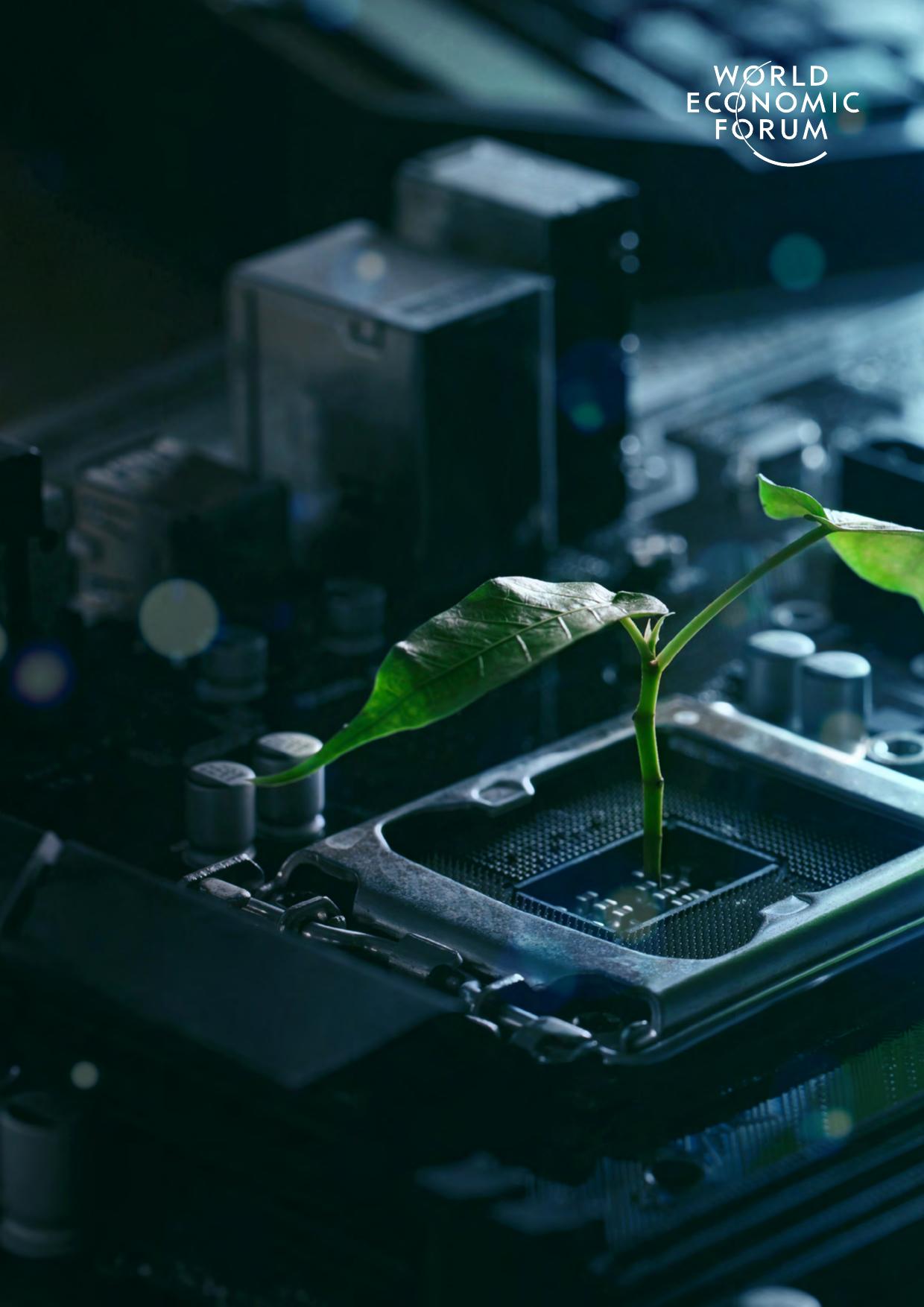RecommendationsfortheDigitalVoluntaryandRegulatedCarbonMarketsBRIEFINGPAPERMARCH2023ContentsImages:GettyImages©2023WorldEconomicForum.Allrightsreserved.Nopartofthispublicationmaybereproducedortransmittedinanyformorbyanymeans,includingphotocopyingandrecording,orbyanyinformationstorageandretrievalsystem.DisclaimerThisdocumentispublishedbytheWorldEconomicForumasacontributiontoaproject,insightareaorinteraction.TheviewsexpressedinthispaperarethoseofthemembersoftheWorkingGrouponBlockchainCarbonCreditsaspartoftheCryptoSustainabilityCoalition,listedbelow,andnotnecessarilythoseoftheWorldEconomicForumoritsMembers,Partnersorotherstakeholders.Introduction1Challengesfacingcarbonmarkets2Recommendationsforthenextgenerationofdigitallynativecarbonmarkets2.1Improvementofgovernance2.2Anaccessiblemarketplace,productdefinitionandclarity2.3Appliedtechnologyforradicalscalability2.4Interoperabilityandtransparencyacrossexchangesandplatforms3ThetimeisnowContributorsAcknowledgementsEndnotes345566789911RecommendationsfortheDigitalVoluntaryandRegulatedCarbonMarkets2IntroductionInordertomeettheParisAgreement’sgoaloflimitingtheglobaltemperatureincreasetobelow1.5°C,itisnecessarynotonlytoreducecarbonemissionsquicklybutalsotocontinuouslyremoveandstoreexistingandfutureexcessatmosphericcarbondioxide.Thiswillrequireabroadarrayofmitigationactivities,includingatransitionawayfromfossilfuels,emissionsreductionprogrammesandcarbonemissionsoffsettingthroughcarboncreditmarkets.1Attheircore,carboncreditsareafinancialtechnologythatenablescapitaltoflowtowardsavarietyofdirect,verifiableactionsformitigatingtheimpactofthechangingclimate.Manyjurisdictionsmanagecarboncreditingfororganizationsandmunicipalitiesviaregulatorybodies(theseareregulatedcarbonmarkets),whilemuchoftheprivatesectorparticipatesincreasinglyinvoluntarycarbonmarkets.Inthispaper,“carbonmarkets”referstoboth.Carbonmarketshavecomeunderheavycriticismfortheirlackoftransparency,accessibility,equitabilityandquality.Despitebroadcorporateinterest,theyalsoremainunderusedandfragmented.Alongwiththiscriticism,andthegrowingdemandforeffectiveandhigh-qualitycarboncredits,thereisarenewedenthusiasmforapplyingemergingtechnologiesandnewapproachestoexpandthereach,credibilityandscalabilityofcarbonmarkets.However,significantworkstillneedstobedone.Thispapertouchesonthemyriadchallengesfacingcurrentcarbonmarketsandsuggestsanambitiouspathforwardsothattheycandeliverpositivelong-termenvironmental,socialandeconomicimpact.Innovativetechnologicalandsocialinfrastructureplayequalrolesinenablingthenextgenerationofdigitalcarbonmarkets.Thispaperfocusesonemergingformsofdistributedledgertechnology(DLT)andtheirapplicabilitytocarbonmarkets,althoughthisisjustoneofthemanytechnologiesneededtofullyenableadigitallynativecarbonmarket.DLTallowscarboncreditstoberepresentedasuniversallyuniquedataentitiesinadigitalend-to-endenvironment.Doingsomakesitpossibletoverifyacredit’sprovenance,trackitssecondaryexchangeandretireitpermanently,withouttheneedforcentralizedintermediaries.RecommendationsfortheDigitalVoluntaryandRegulatedCarbonMarketsMarch2023Theleadauthorsofthisbriefingpaperare:EvînCheikosman,Director,BlockchainLawforSocialGoodCenter,UniversityofSanFrancisco;PolicyAnalyst,CISA,WorldEconomicForum,USA(2020–2023);JoshKnauer,Co-Founder,ReSeed.farm;LaurenSerota,Advisor,Funga.RecommendationsfortheDigitalVoluntaryandRegulatedCarbonMarkets3Challengesfacingcarbonmarkets1Thesearethebiggestchallengestobeovercome:2Lackoftransparency,integrityandconfidenceinthemonitoring,issuance,sale,retirementandbenefitsdistributionofcarboncredits,aswellasinthird-partycertificationsWithoutauditabilityandvisibilityintothesupplychain,itisdifficultforbuyerstomakeinformeddecisions.Thisiswhereblockchaintechnologycouldplayarole,althoughsystemsthatuseblockchainstillrelyondatafromlegacysystemsandcanbedifficultfornon-expertstoauditandunderstand.3Manycurrentverificationbodieshaveopaqueandoutdatedprocessesandhavebeenslowtointegratenewtechnologiesthatcouldhelpscaletheentireonboardingandverificationprocess.Oneresultisthatcarbonbuyershaveahardtimedeterminingthequalityofthecreditstheyarepurchasing,andsotheymanagereputationalriskbyhiringintermediaries,whodriveupcostsandhavenoincentivetomakechangesandadoptemergingtechnologies.Thisstiflesmarketactivityandmakesitevenhardertomeetclimatetargets.Thelackofastandardizedterminologyfordescribingcarboncreditsmakesithardforpotentialbuyerstocomparecreditsfromdifferentsourcesandconfidentlypurchasewithoutthehelpofintermediaries.Theuseoftheterm“token”(ratherthan“credit”)intheblockchainindustryhasonlyaddedtotheconfusionandhasraisedregulatoryconcerns.Inaccessibility,inequityandlackofparticipationincarbonmarketsbywomen,localcommunities,smallholderlandstewards,IndigenouspeopleandothervulnerablepopulationsConcentrationsofpowerandvulnerabilitiestocorruptionunderminethecredibilityofcarbonmarkets.Participationisprohibitivelyexpensiveandoperationallyintensive,makingitdifficultforevenwell-fundedcarbonprojectstogetofftheground.Thehighcostsassociatedwithlegacycarbonmarketparticipationmeanthatbillionsofsmallholderlandstewardsgloballyareexcludedfromthemarket.4DespiteclearguidancefromtheIntergovernmentalPanelonClimateChange(IPCC)5onsocialandenvironmentaljusticestandards,creditsbroughttomarketrarelyhaveanysocioeconomicimpactdataassociatedwiththem.Whileinclusionofthesemajoritypopulationsrequiresfundamentalshiftsinbusinesspracticesandgovernance,suchengagementandequitabledistributionofcorrespondingcarboncreditrevenuecouldbeautomated,documentedandmonitoredusingablockchain.InsufficientscaletomeetclimatecommitmentsCurrentmeasurement,reportingandverification(MRV)methodologiesarenumerous,requiresignificantmanualwork,areslowtofollowandmeasureagainstandareoftenredundant.Manymethodologiesforthecollection,analysisanddistributionofdataremainnon-digitalandlackmachine-readableauditability.Thelackofaclearvaluestructureandmethodologicalinclusionofotherecologicalandsocioeconomicfactors–suchasbiodiversity,watershedprotectionandcommunityimpact–makeitevenhardertocreatemeaningfulimpactgiventhecurrentmarketdynamics.RecommendationsfortheDigitalVoluntaryandRegulatedCarbonMarkets4Recommendationsforthenextgenerationofdigitallynativecarbonmarkets2Governanceofcarbonmarketsreferstotheprocessesandmechanismsbywhichcarboncreditsareissued,verifiedandtraded.Governancecanhaveasignificantimpactontheeffectivenessandcredibilityofcarbonmarketsandtheiroverarchingobjectiveofreducinggreenhousegasemissionsandpromotingsustainabledevelopment.Goodgovernanceofcarbonmarketsrequirestenetsoftransparencyandrigourofdata,meaningfulinclusivityanddiversityinparticipation,aswellasflexibilityandscalabilityofprocesses.Promoteinclusive,equitableandtransparentgovernance.Healthyenvironmentalsystemsneedhealthyhumansystems.Toenablebetter-informeddecisionsandaddressthecomplexchallengesposedbyclimatechange,governancemustbeinclusive,flexibleandmultidimensionalatalllevelsofengagement.Thisincludestechnologicalflexibility–governancemustsupportinclusive,informedandtransparentparticipation,bothonline(usingtechnologiessuchassmartcontractsandvideoconferencing)andoffline(e.g.communityroundtablesandothercommunityeducationefforts).Itiscriticaltoincludeprovisionsforequitableparticipation,safeguardstoprotectwhistleblowersandsanctionstopunishmaliciousactors.Governanceatscalemayrequireinvestmentsineducationandincludingstakeholderstoensurefullengagementinthesystem.Includevulnerablepopulationsandwomen’sempowermentingovernanceandbenefitsharing.Includingvulnerablepopulations6andpromotingwomen’sempowermentincarbonmarketgovernanceprocessesensuresequitabledecision-makinganddistributionofbenefits,enhancesthecredibilityandviabilityofcarbonprojectsandminimizesthenegativeconsequencesofdesignbyisolatedindustryplayersandsystems.Toencouragetransparentandinclusivegovernanceofcarboncreditprojects,itisnecessarytoensureequitablerepresentationoflandstewardsearlyinthedesignandimplementationprocess,aswellasinthecreationofpolicies,programmesandfunds.Buildlocal/globalcapacitiesforparticipation,andindustrycapacitiesforunderstanding.Incumbentpowerstructureshaveexcludeddiverseperspectives,bydesignorthroughignorance.Facilitationofdiversevoicesneedsmorethananinvitation.Itrequiresinvestment,theprovisionoftoolsandinformationtobringallrepresentativestothesamebaselineofunderstandingonvariedtopics,fromthecomplexitiesofcarbonmarketstotheintricaciesofIndigenouslandpractices.Improvementofgovernance2.1Thefollowingpagesdetailrecommendationsfordevelopinganext-generationcarbonmarketinfrastructurethatpowersamoreefficientandtransparentenvironmentforprojectdevelopers,localpopulationsandbuyersalike.Foreachrecommendation,thereisanoutlineofwhatisrequiredandwhy.ThereisalsoananalysisofthepotentialforspecificapplicationsofDLTtofacilitatecoordinationofglobalanddiversestakeholders,andtheactivitiesrequiredtoseelarge-scaleclimateimpactfromthecarbonmarket.RecommendationsfortheDigitalVoluntaryandRegulatedCarbonMarkets5Effectivemarketscancreatetheconditionsfortheemergenceofdynamicandadaptableproductstosolvethechallengesfacingdiversestakeholders.Butthisfunctionalityispossibleonlyifpurchaserscaneffectivelydistinguishsignalfromnoise.Bringingthisclaritytocarbonproductsrequiresreducingobstacles,redundancyandconfusionwhilestreamlininganddefiningtheunderlyingbenefitstoclimateandsociety.Ensurecarbonmarketsadoptacommonbaselinetaxonomytoprovideclarity.Carboncreditsshouldhavestandardizedanddetailedlabelstoenableeaseofunderstandingandcomparability.7Importantnon-carbonattributes,suchasachievingtheSustainableDevelopmentGoals,8includingenhancedbiodiversityandmeaningfulcommunitybenefits,shouldbeclearlydefinedandeasilyidentifiable.Expandcarbonmarketstoincludeefficientpricediscoveryandthecreationofinnovativenewfinancialproductsand“beyond-carbon”tradableassetsincludingfactorssuchasbiodiversity,socialvalueandIndigenousrights.Digitalcarboncreditscanexpandthemarketbytradingonopenandaccessibleexchangesthathighlighttheauditabledata-backeddifferencesamongthecredits.Thispromisestoremovetheconsiderablefrictionanduncertaintysurroundingbuyingandsellingcreditsthatcurrentlyexists,toincreasevisibilityforpricediscoveryandmakeiteasiertofundthemarket’sexpansion.Usean“end-to-end”digitalenvironment,includingDLT,toenableefficientdatacapture,analysisandauditability.9Usingtechnology-baseddatacollectiontoolssuchasdigitaldecentralizedmeasurement,reportingandverification(MRV),andmakingsuchdataavailableinanopen-sourceandhuman-readableformat(e.g.onablockchain-basedledgerwithanon-technicalinterface),canresolvechallengesassociatedwithtrust,transparencyandinteroperabilityincurrentsystems.Thiscanleadtoenhancedconfidenceinthemarket,betterandmoreseamlessparticipationforbothsellersandbuyersandgreaterscale.Digitalcarboncreditscanenableuniquedemand-sideusecases.Everydaypurchasescanmoreeasilyandcrediblyhavethecostoftheiremissionsbakedintotheirpurchase,asseenalreadywithairlinebookingsandsomee-commerceplatforms.Industriescanintegratetheretirementofdigitalcarboncreditsdirectlyintotheiroperationssothatemissionsarecompensatedforinrealtime,ratherthanonaquarterlyorannualbasis.Anaccessiblemarketplace,productdefinitionandclarity2.2Thisisanunprecedentedtimeintermsofthecapabilityandabundanceofsophisticatedtechnologies.Usingavailableandaffordableemergingtechnologiessuchasnear-fieldcommunicationdevicesandrobustLIDARsatelliteimaging,itispossibletoscaleinnovationsindigitallyrepresentingreal-worldassetswithintegrity.Usedigitallynativecreditstosupportmoreautomationinvalidationandverification.Theimmediateadvantageofdigitallynative10creditsovertheirpastiterationsisareductionintheoverheadexpensethroughacredit’slifecycle.Machinereadabilityandautomationfurthercontributetothestreamliningofprocesses.Oneexampleisthetranslationofprotocoldocumentationintoastandardsetofdatapoints,enablingthemonitoringofprotocoladherenceviaacombinationofdatafeedssuchassatelliteimageryorinternetofthings(IoT)sensors(ratherthanrelyingsolelyonconsultantsfromavalidationandverificationbodyphysicallyvisitingtheprojectsite).Ensurebetteruseofemergingtechnologies.Technologiessuchasadvancedremotesensing,artificialintelligenceandmachinelearningandIoTsensors,incorporatingauditablerecordswrittenbyDLT,areexamplesofcombiningemergingtechnologies,toolsandmodellingtohelpachievescale.Forexample,blockchainsandsmartcontractscansupportMRVasacoordinatedandrepeatableeffortacrossadiversegroupofsensorsandstakeholders.Reducefrictionandincreaseconnectivitybetweenbuyersandsellers.Digitallynativecarboncreditsimprovetheverifiabilityandtransparencyofcreditinformationbyprovidinganimmutablerecordofcreditprovenance,aswellasattachingcreditmetadata,suchasverificationreports,inmachine-readableformats.ConnectingbuyersmoredirectlytosellersreducesthenumberofintermediariesneededinAppliedtechnologyforradicalscalability2.3carboncreditscanenableuniquedemand-sideusecasesDigitalRecommendationsfortheDigitalVoluntaryandRegulatedCarbonMarkets6themarketplace,thusremovingopportunitiesforextractivefeesanddeliveringahigherpercentageofrevenuetosuppliers,projectdevelopersandlandstewards.Amoredirectconnectiontomarketsmayalsoincreaseaccessformarginalizedpopulations,efficiencyandpricetransparency.Prioritizetrustandtransparencythroughopen-sourceMRVprotocols.Usingscalable,inexpensiveandeasilypeer-reviewedMRVprotocolscanhelpimprovecarbonmarkets’transparency,credibilityandeffectiveness.Accesstoaschemainanopenformatallowsformoreinclusiveandtransparentdecision-makingfromallsectors,resultinginmoreimpactfulinterventionsandeffectiveclimatepolicies.Protocolsthatareeasilypeerreviewedcanhelpensuretheaccuracyandreliabilityofdataandbuildtrustandconfidenceinthemarket.Theparticipationofadecentralizedanddistributedgroupofdiverseplayersoperatingonvastlydifferenttechnologiesbuildstrustinthevalidityofcarboncreditsandhelpsachievescaleinthemarkets.Marketplayersshouldconsiderthefollowingrecommendationstomaximizeinteroperabilityandtransparencyacrosstheindustry.Buildforsystems,notsilos.Openapplicationprogramminginterfaces(APIs)accessingblockchaindatahavethepotentialtoimproveverifiability,reducetransactioncostsand,toalesserdegree,addresstheconcernsofsomeprojects.Whilenotanewtrend,theavailabilityofwell-documentedandaccessiblepublicAPIsiscritical.Asindustries–especiallythosethathavebeenslowertoadopttechnology–undergodigitaltransformation,accessibleAPIsplayanimportantroleindeliveringtransparency,connectivityandinnovation.Thereisalsoaneedtodevelopadatastandardthatharmonizesthedatapointsavailableforeachcarboncreditindifferentregistriesandenablesinteroperabilityacrossdifferentissuersofcarboncredits.11Designforhowandwhyastakeholderwantstoconsumeyourdata.UnderstandingwhyandhowthirdpartieswillconsumeyourdataiscriticaltoaffectingAPIdevelopment.Consider,asanexample,acarboncreditregistry.BydevelopinganAPIthatallowsathirdpartytointeractwithcarboncreditsmoredirectly,theregistrycouldestablishanautomatedcarboncreditusagereportingfunctionthatautomatesaprocessthatnormallytakesweeksandinvolvesmanualintervention.Appropriateuseofsmartcontractswouldminimizemanualreconciliationeffortsbetweendisparatesystemsbycreatingmachine-readableagreementsandauditabletrackingofcreditsthroughouttheirlifecycle.Createdigitallynetworkedcarboncredits.APIsplayanimportantroleinconnectingconsumers,devicesandservicesthroughtheIoT.TheIoTcreatesmorecommunicationpointsamongdevicesandusers,requiringsecureAPIstoeffectivelyreceivedataandcreateledgerentriesfordataanalysisandtodriveinsights.Forcarboncredits,thisenablestransparencythroughtheeffectiveuseofsensors,drones,etc.SellersofcarboncreditscouldusereadingsfromIoTdevicestodifferentiatetheircarboncreditsinacrowdedmarket,enablingbuyerstoviewforestsinrealtimeorreadsoil-sensordatatohighlightcarboncaptured.Demandandbuildtowardsindustrystandards.Asinfrastructurematures,standardsandestablishedwaysofworkingwillacceleratetherateandspeedatwhichnewcreditscometomarket.CollaboratingwithindustryworkinggroupssuchastheCryptoSustainabilityCoalition,12theCryptoCouncilforInnovation,13theBlockchainLawforSocialGoodCenter14ortheGlobalBlockchainBusinessCouncil’sInterWorkAlliance15groupwillenablecarbonmarketparticipantstofurtherdrivestandardization.Interoperabilityandtransparencyacrossexchangesandplatforms2.4RecommendationsfortheDigitalVoluntaryandRegulatedCarbonMarkets7Thetimeisnow3Climatechangeisthegreatestexistentialthreatthathumanityfacesandmanyactionsareneededinresponse.Acomprehensivetransitionawayfromfossilfuelstoreduceemissionsisessential,asisthedrawdownofhundredsofgigatonsofcarbondioxide16fromtheatmosphere.Themainoutcomesthecarboncreditmarketsneedtofocusonare:thereductionofemissionsasquicklyaspossible,theprotectionofnaturalcarbonsinksandtheremovalofcarbondioxidefromtheatmosphere.Creditsissuedtocertifytheseoutcomesarefallingshort,withreduction,protectionandremovalcreditsachievinglessthan20%ofIPCCgoals.17Disruptionofthelegacycarbonmarketsiscurrentlyoccurringasaresultoftheurgencyofsolvingtheproblem,combinedwiththeadvancesinemergingtechnologiesthatcansupportnewtransformativesolutionsforengagingbroadercommunitiesofstakeholderswithgreatertransparency,efficiencyandequity.Emergingtechnologiessuchasblockchainarenotapanacea,butunderstandingtheirbenefitsandhowtheyworkenablesbroaderandmoreinformedexperimentationtohelpachievehumanity’sgoals.Howeffectivelythepotentialsolutionstothisglobalexistentialthreatarenavigatedmaywelldeterminethefutureoflifeonthisplanet.Therecommendationsinthispaperonharnessingemergingtechnologies,empoweringgreaternumbersofpeopletoparticipateandcreatingequitableeconomicincentivescanhelpmeetthischallengeatscale.RecommendationsfortheDigitalVoluntaryandRegulatedCarbonMarkets8ContributorsAcknowledgementsLeadauthorsEvînCheikosmanDirector,BlockchainLawforSocialGoodCenter,UniversityofSanFrancisco;PolicyAnalyst,CISA,WorldEconomicForum,USA(2020–2023)JoshKnauerCo-Founder,ReSeed.farmLaurenSerotaAdvisor,FungaContributingAuthorsGiselBoomanHeadofScience,RegenNetworkDevelopmentClaudiaHerbertProductManager,CarbonDirectRachelMaherProductOwner(2021–2023),OpsChainESG,Ernst&YoungAntoinetteMarieDirector,HeiferLabs,HeiferInternationalAdamShedletzkyDirectorofPolicy,FlowCarbonLuisFelipeAdaimeFounderandChiefExecutiveOfficer,MOSS.EarthSadiaAhmedClimateChange&EnvironmentStudioLead,DeloitteMarcusAureliusCoreContributor,DataandStrategy,KlimaDAOSrikrishnaBalachandranDirector,RecykalSethBaruchChiefExecutiveOfficer,CarbonomicsGiselBoomanHeadofScience,RegenNetworkKevinChristopherPrincipal,RockbridgeVenturesDanaGibberCo-FounderandChiefExecutiveOfficer,FlowCarbonErinGroverImpactInvestmentAdvisor,AltaiDigitalCapitalAlexsandraGuerraHeadofDemandandCo-Founder,NoriJoyGuoChiefOperatingOfficer(2022–2023),CCTokenClaudiaHerbertProductManager,CarbonDirectAnirudhaJalanCo-FounderandChiefStrategyOfficer,RecykalJoshKnauerCo-Founder,ReSeed.farmLarryKopaldCo-FounderandPresident,TheCarbonUndergroundRenanKrugerChiefTechnologyOfficer,MOSS.EarthGregoryLanduaCo-Founder,RegenNetworkJohnLeeGlobalManagingDirector,CapitalMarkets&Exchanges,AccentureAnnaLernerChiefExecutiveOfficer,ClimateCollectiveMarkLewisManagingPartner,TrailheadCapitalMembersoftheCryptoSustainabilityCoalitionWorkingGrouponBlockchainCarbonCreditsRecommendationsfortheDigitalVoluntaryandRegulatedCarbonMarkets9ZhiliangLiChiefExecutiveOfficer,CCTokenRachelMaherProductOwner(2021–2023),OpsChainESG,Ernst&YoungAntionetteMarieDirector,HeiferLabs,HeiferInternationalDarenMcKelveyHeadofCryptoPartnerships,NoriRadhikaMoolgavkarProgramManagerSupplyandMethodology,NoriCharlieMooreHeadofCarbon&SustainabilitySolutions,ChainlinkLabsTimothyRannSeniorAdvisor,MercyCorpsLaurenSerotaAdvisor,FungaAdamShedletzkyDirectorofPolicy,FlowCarbonJulianSommerCo-Founder,Chairman,ChiefImpactOfficerandChiefFinancialOfficer,ToucanProtocolKenWeberHeadofSocialImpact,RippleAlasdairWereDigitalInnovation,InternationalEmissionsTradingAssociation(IETA)DarrenWolfbergFounder,ChairmanandChiefExecutiveOfficer,BlockchainTriangleNicolasAlexanderHeadofPartnerships&Policy,ThalloHayleyAnnaProjectCoordinator,CISA,WorldEconomicForum,USASamAzadProductOwner,OpsChainESGatErnst&YoungTillemBurlaceRegionalLead,Africa1t.org,WorldEconomicForumBrynlyLlyrHeadofBlockchainandDigitalAssets,CISA,WorldEconomicForum,USAMicheleNeitzFoundingDirector,BlockchainLawforSocialGoodCenter,UniversityofSanFranciscoAlexanderNeumullerResearchLead,DigitalAssetsClimateAspectsatCambridgeCentreforAlternativeFinance,CambridgeJudgeBusinessSchool,UniversityofCambridgeStefanRentonSustainabilityLead,PolygonLabsYipThy-DiepTaCo-Founder,UnitNetworkTriciaWangExecutiveDirectorandCo-Founder,CryptoResearchandDesignLab(CRADL)SheilaWarrenChiefExecutiveOfficer,CryptoCouncilforInnovationKieranWhiteCo-Founder&ChiefExecutiveOfficer,ReturnSpecialthankstotheCISAteam,membersoftheCryptoSustainabilityCoalition,theCISASteeringCommitteeandExpertReviewers:RecommendationsfortheDigitalVoluntaryandRegulatedCarbonMarkets10Endnotes1.Pomeroy,Robin,“CarbonOffsets–HowDoTheyWork,andWhoSetstheRules?”,WorldEconomicForumAgenda,2September2023:https://www.weforum.org/agenda/2022/09/carbon-offsets-radio-davos/.2.“TheVoluntaryCarbonMarket:ClimateFinanceatanInflectionPoint”,WorldEconomicForum,17January2023:https://www.weforum.org/whitepapers/the-voluntary-carbon-market-climate-finance-at-an-inflection-point/.3.AuditingablockchainrequiresnavigatingtechnicalWeb3systemsandinterfaces;seePejlatowicz,Pablo,“DemocraticPrinciplesandtheStateofVotinginWeb3”,Medium,31January2023:https://medium.com/cradl/democratic-principles-and-the-state-of-voting-in-web3-e5ea00c0adac#:~:text=Need%20for%20voters,with%20blockchain%20voting.4.Knight,Aimée,“WhatIsaSmallholderFarmer?”,HeiferInternational,14April2022:https://www.heifer.org/blog/what-is-a-smallholder-farmer.html.5.“WorkingGroupIIImpacts,AdaptationandVulnerability”,IPCC,10February2023:https://www.ipcc.ch/working-group/wg2/.6.“ClimateChange2022:Impacts,AdaptationandVulnerability”,IPCC,15February2023:https://www.ipcc.ch/report/ar6/wg2/.7.TheCADTrust–aninitiativeoftheWorldBank,theInternationalEmissionsTradingAssociationandtheGovernmentofSingapore,withrepresentativesofmajorcarbonstandardsaswellasgovernmentsparticipatinginagoverningcouncil–hastakensomeimportantfirststepstoaddressthisissue.Formoreinformation,seeClimateActionDataTrust,“ConnectingCarbonMarketsthroughOpenData”:https://climateactiondata.org.8.“The17Goals”,UnitedNationsDepartmentofEconomicandSocialAffairs,SustainableDevelopment,10February2023:https://sdgs.un.org/goals.9.Forexample,theWorldBankhasdevelopedablockchainclimatewarehouseandiscurrentlyonboardingnationalandprivate-sectorpartners.SeeClimateWarehouse,“CatalyzingtheNextGenerationofClimateMarkets”:https://www.theclimatewarehouse.org/.10.Digitallynativeor,inotherwords,tokenizedcarbon,isthedigitalrepresentationofreal-worldcarboncreditsontheblockchain.Seemorehere:https://blog.toucan.earth/tokenization-of-carbon-credits-explained/.11.SeeworkbeingdonebytheClimateActionDataTrist(https://climateactiondata.org)asanexample.12.“NewCryptoSustainabilityCoalitiontoInvestigatePotentialofWeb3TechnologiesinFightingClimateChange”,WorldEconomicForum,21September2022:https://www.weforum.org/press/2022/09/new-crypto-sustainability-coalition-to-investigate-potential-of-web3-technologies-in-fighting-climate-change/.13.TheCryptoCouncilforInnovationisthepremierglobalallianceadvancingcryptoinnovation.Seemorehere:https://cryptoforinnovation.org/.14.TheBlockchainLawforSocialGoodCenterwasconceivedandlaunchedbyProfessorMicheleNeitzinFebruary2022toaddressagapinawarenessofandeducationaboutexistingandinnovativesocialimpactprojectshappeningintheblockchainspacethatwouldbeofinterestandimportancetothepublicaswellaslegislatorsandpolicy-makers.15.TheInterWorkAlliance(IWA),aninitiativeoftheGlobalBlockchainBusinessCouncil(GBBC),empowersorganizationstoadoptandusetoken-poweredservicesintheirday-to-dayoperationsandacrossusecasesandnetworks,bringinginclusivitytogloballydistributedapplications.Seemorehere:https://gbbcouncil.org/interwork-alliance/.16.“SpecialReport:GlobalWarmingof1.5ºC:SummaryforPolicymakers”,IPCC,10February2023:https://www.ipcc.ch/sr15/chapter/spm/.17.“TheStateofCarbonDioxideRemoval”,CarbonDioxideRemoval(CDR),5February2023:https://www.stateofcdr.org/.RecommendationsfortheDigitalVoluntaryandRegulatedCarbonMarkets11WorldEconomicForum91–93routedelaCapiteCH-1223Cologny/GenevaSwitzerlandTel.:+41(0)228691212Fax:+41(0)227862744contact@weforum.orgwww.weforum.orgTheWorldEconomicForum,committedtoimprovingthestateoftheworld,istheInternationalOrganizationforPublic-PrivateCooperation.TheForumengagestheforemostpolitical,businessandotherleadersofsocietytoshapeglobal,regionalandindustryagendas.



 VIP
VIP VIP
VIP VIP
VIP VIP
VIP VIP
VIP VIP
VIP VIP
VIP VIP
VIP VIP
VIP VIP
VIP